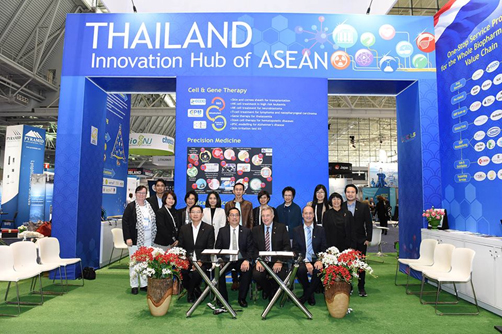Pharmaceuticals & Regenerative Medicine
From drug discovery to market, our program offer solutions that can help researchers, local and international companies to develop innovation into success and manage risks.
The scope of Pharmaceutical and Regenerative projects are focus on drug discovery & development, pharmacogenomics, biopharmaceutical products, regeneratives and generics. The majority of these projects are performed in public-public, or public-private partnerships.
Our projects:
1. Biopharmaceuticals
The Thailand Center of Excellence for Life Sciences (TCELS) has partnered with NSTDA (National Science and Technology Development Agency), KMUTT (King Mongkut’s University of Technology Thonburi), MU Mahidol University, The Thai Red Cross Society, NVI (National Vaccine Institute) and private sectors like BJC (BERLI JUCKER PUBLIC COMPANY LIMITED) to support and develop biopharmaceutical researches to innovations and commercialization in Thailand and oversea. The partnership with publics and privates organizations will be the beginning of our relationship to implement Thailand 4.0 policy. For the first 5 years we have planned to develop these 4 products:
- Erythropoietin
- Growth Hormone
- Trastuzumab
- Antibody against EV71
2. Pharmacogenomics
Pharmacogenomics is the study of human genetics in relation to individuals’ different responses to drugs. This helps in prescribing personalized medicine and reducing allergies and side effects due to use of the wrong medicine. Pharmacogenomics is a powerful tool for drug selection for individual patients so as to reduce the chance of unwanted side effects and the failure of treatment. A reduction in drug side effects can also bring down the cost of treatment. This is particularly beneficial for developing countries with limited resources like Thailand. TCELS is supporting the Pharmacogenomics Project of Ramathibodi Hospital, Mahidol University.
Under the Pharmacogenomics project, research is also being carried out on the five key diseases that threaten the health of Thais: thalassemia, diseases of the cardiovascular system, AIDS, leukemia in children and dihydropyrimidine dehydrogenase disease (DPD).
Among the top 10 drugs responsible for causing adverse drug reactions (ADRs) in the Thai population, many predictive genomic markers have been found for eight drugs that can be used to screen out those with a high risk of severe ADR. Pharmacogenomics can provide doctors with information to tailor treatments to each individual, rendering low-cost, off-patent drugs almost as effective as modern medicines but with fewer side effects.
These consist of a group of anticonvulsant drugs (Carbamazepine, Phenobarbital, and Phenytoin), the drug treatment for Gout (Allopurinol), and the group of national first-line antiretroviral drugs (Nevirapine, Efavirenz, Abacavir and Starvudine).
The pharmacogenomics program has yielded tangible products, including genetic test kits for AIDS, cardiovascular diseases, and Post-Traumatic Stress Disorder (PTSD). The project has been approved to receive a patent for the process that identifies a correlation between a person’s genetics and their allergy to the drugs Nevirapine and Stavudine, commonly known as d4T-based drugs for AIDS treatment. In collaboration with the Ministry of Public Health (MOPH) and the Riken Institute of Tokyo University, there is now an established unit for Pharmacogenomics and Bioinformatics and a laboratory for genetic analysis that meets the ISO 15189: 2007 standard.
Currently, the pharmacogenomics program is focusing on RICP (rare/genetic diseases; infectious diseases; cancers; and Pharmacogenomics), whereby the whole genome is sequenced and then analyzed by a panel of experts. They examine the rare/genetic diseases, like autism which run genetically; infectious diseases, such as HIV; cancers that are treatable if the genome sequence is known; and all of this is done through Pharmacogenomics.
Building on the success of this pharmacogenomics program, TCELS is currently developing a personalized medicine based business model that can be a spin off from the capabilities and assets of this project.
Medical Genomics Center and South East Asia Pharmacogenomics Research Network
TCELS, Department of Medical Sciences; Ministry of Public Health, Ramathibodi Hospital; Mahidol University, and Riken, Genome Research Institute, Japan, which have been collaborating in genomic research since 2006, joined hands to push for a pharmacogenomics network in Southeast Asia by inviting leading researchers from Japan, Korea, Taiwan, Malaysia, Indonesian and Thailand to share knowledge and experience in pharmacogenomics research. To achieve sustainable pharmacogenomics research, countries need to work together in conducting clinical trial studies in various drugs, which are effective and free of side effects for 560 million Southeast Asians. This year SEAPharm research networks held on 6-7 August, 2018 at Matrix Building, Biopolis, Singappore.
Reference Genome projects
Thailand Center of Excellence for Life Sciences (TCELS), Mahidol University and Thailand Research Fund (TRF) jointly announced the Thailand Population Genome Project and national Biobank initiatives during the 1st SEAPHARM – IRN meeting of this year. The pilot project includes whole genome sequencing of the Thai population to establish medical centers, benefit Thai and Southeast Asian people.
TCELS has supported medical genomics center to provide research and service entitle “Genome-guided Personalized Medicine” at Medical genomics center which is located at the 3rd floor, Revadee medical research center, Faculty of Ramathibodi medical hospital, Rama VI road, Bangkok.
3. Generics
TCELS encourages the discovery of new drugs and development of new generics. Along with the Faculty of Pharmaceuticals of Chulalongkorn University, TCELS has supported roadmap study and develop new 2 drug delivery system. TCELS recognizes the importance of developing it further and taking it to the level of commercial production. For this, TCELS has partnered with Polipharm Co., Ltd to develop products to pre-industrial level.
4. Natural Product Drug Discovery Networks
Natural products have been the single most productive source of leads for the development of drugs. Application of molecular biological techniques is increasing the availability of novel compounds. By mean of High throughput screening. TCELS has signed MOU with BIOTEC/NSTDA, Chulalongkorn University, and Mahidol University for support and develop natural products drug discovery to new innovations in Thailand and international. This partnership has initiated the pilot projects this year.
5. Regenerative medicine
Under the auspice of TCELS, we ensure cell and gene therapy products on quality control services complying with global standard. We aim to develop infrastructures and to provide support the new approaches for treating diseases for regional access and worldwide market.
Main Infrastructures
5.1 Excellent Center for Drug Discovery: ECDD
The collaborative efforts between TCELS and Mahidol University which operate in the field of Pharmaceutical research, drug discovery and molecular basis. ECDD equipped with high throughput and high content screening automation that provides the research community with cost-advantaged, high-technology instrumentation and services.
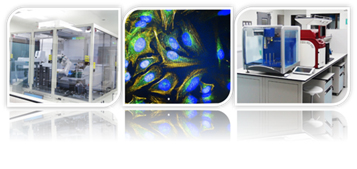
-
- 5.2 GMP Production Unit for Cell and Gene Therapy Products, Cell and gene Production Unit: CPU
CPU is located at 2nd floor Tower C of Innovation Cluster II, Thailand Science Park, Pathum Thani. The facility has been approved for the production of Intravenous injection products, according to the GMP standard by Thai FDA, Ministry of Public Health. CPU serves as high quality facility for R&D and Clinical trial products. The unit can also cope with the expansion of the prototype to commercial both for cell and gene therapy products. CPU also provide the one stop service center for QA/QC of cell products for safety used to the patients and clients. For more information
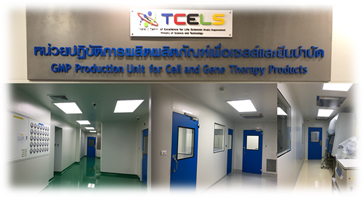
5.3 Automated Tissue Kulture: ATK
The automated cell processing system that supports R&D activities and the growing demand of affordable cell products. ATK will comply with the GMP guidelines to ensure patient safety and the efficacy of treatments and serve as a research translation model for cellular products in the pipeline.

- Our Support
- Mapping stem cell research & Roadmap for Cell and Gene Therapy in Thailand
- Guidelines/System for Cell Registry
- Regulation/Guidance for industry
- Funding/ Community building / Partnering/ Infrastructure
- Business matching/ Consulting / Training/ Business Plan/ Marketing
Cell & Gene Therapy Program’s Framework
6. Capacity building/training
- OECD GLP training
- Clinical research roadmap, Thailand
- ICH GCP
- ThaiTECT network
- Thai Clinical Trial Registry
Networks ISPE
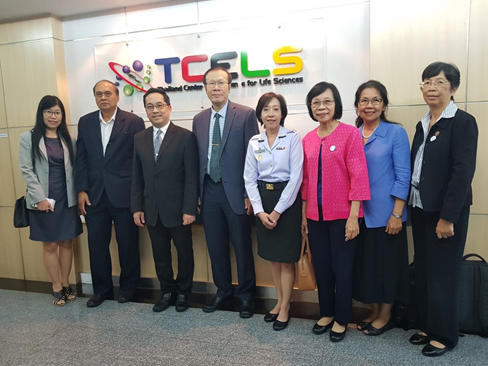
- Networks APAC
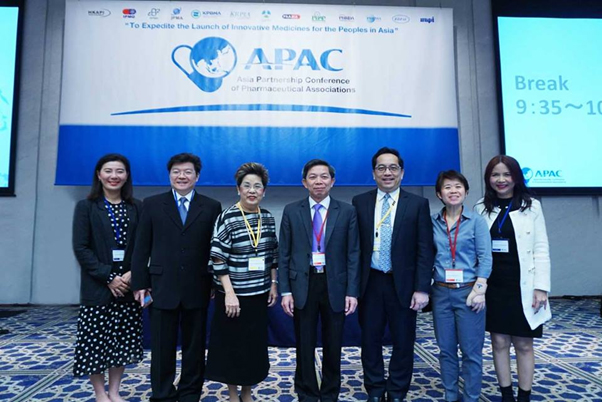
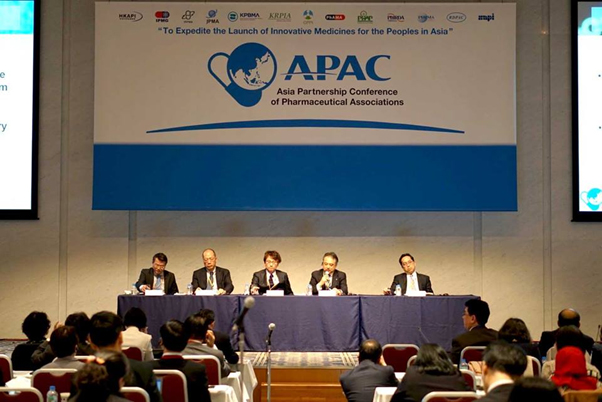
- BIO international
